Five faculty members were named Meigs Distinguished Professors for 2022. The professorship is the university’s highest recognition for instruction at the undergraduate and graduate levels. Meigs Professors receive a permanent salary increase of $6,000 and a one-year discretionary fund of $1,000.
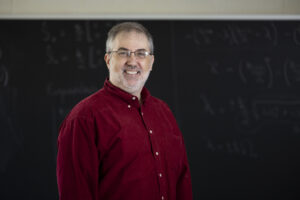
Steven Lewis
Associate Professor
Department of Physics and Astronomy
Franklin College of Arts and Sciences
Steven Lewis always stays on top of the latest in physics pedagogy.
From the very beginning of his career at UGA, Lewis has found original ways to reinforce principles to help students build strong
conceptual knowledge.
“In my view, effective teaching involves actively engaging students fully in their own learning,” he said. “The teacher is the guide, perceiving where the students are coming from and where they need to get to and helping them chart and navigate a smooth and productive course for their educational journey.”
Lewis rarely just delivers content to his students. He’d much rather them be “active participants in building the story.”
Lewis frequently uses think-pair-share activities in classes, where students interact with peers in small groups in class to actively engage with the material. He also hosts weekly problem-solving clinics for nearly every class he offers, and those vary, depending on the course. For introductory classes, students form into small groups and work on that week’s problem set with Lewis offering feedback. For upper-level and graduate classes, Lewis provides one or two problems related to that week’s class material, and the students go up to the board one-by-one to work through parts of the problem, often with input from their peers and Lewis. The benefit of the clinics is that students get productive and immediate feedback on their understanding and technique.
“Dr. Lewis was a major inspiration for me while I was studying physics, and he serves as a role model for the kind of professor I want to become one day. He is an excellent professor in both teaching and advising and forms meaningful connections with his students that help keep them engaged both in and outside the lectures,” one former student wrote. “He helped me become the physicist I am today, and it’s not an exaggeration to say I owe him my entire career.”
—Krista Richmond
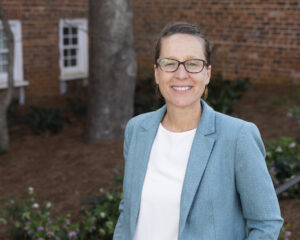
Rebecca Matthew
Associate Professor
School of Social Work
Rebecca Matthew has an instructional style that is confident, easygoing, engaging and stimulating.
In the classroom and as a mentor, she continually shows a dedication to her students.
“Instead of merely lecturing, she engages students throughout the class, intellectually challenging them to think critically about important issues, especially issues we take for granted in the social work field,” one colleague wrote.
In fact, a big part of her instruction is getting outside the classroom and into the community. Matthew, who also serves as courtesy faculty in the College of Public Health’s Department of Health Promotion and Behavior, engages students with experiential learning and community partnerships.
In the Athens Well-Being Project, she collaboratively supervised a team of 79 master’s-level social work students in the collection of primary, open-access, neighborhood-level data. Those findings have fostered ongoing efforts to support community well-being. Community-based experiential learning is likewise central to her community assessment course. In 2014, she led 15 students in supporting a local community development organization to conduct a community assessment, which involved an analysis of historical/archival data, in addition to conducting interviews and focus groups throughout the community. Those findings have been used to support community planning and grant-seeking efforts.
“Dr. Matthew redefines and exemplifies what it means to carry out the academic triad, specifically as a professor of social work. Her work profoundly integrates teaching, service and research,” one former student wrote. “Her dynamic teaching, infused with service and research, both ignites and directs the passions and interests of her students and reverberates in such a way as to not only advance knowledge in the field of social work, but also to have a significant impact on students, the community and beyond.”
Matthew has advised more than 40 students, supervised 11 mentored research projects (at the doctoral, master’s and undergraduate levels), served on 10 doctoral exam/dissertation committees, worked closely with 10 graduate research assistants and mentored 20 graduate and undergraduate students.
—Krista Richmond
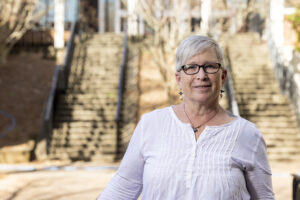
Patricia Moore
Professor
Department of Entomology
College of Agricultural and Environmental Sciences
Patricia Moore’s favorite types of questions are those for which the answer is, “I don’t know.”
She wants her students to become successful scientists driven by curiosity and aims to foster a confidence that allows them to say, “I don’t know that, but I know how I might find out.”
“The primary objective of higher education is to teach people to learn how to learn. Our students need the skills to adapt and develop along with a changing world if they are going to be successful in their careers,” she said. “I try to focus on the process by which we understand the natural world, helping students to develop the analytical and critical thinking skills necessary to evaluate new information and assess its quality. In my experience, moving to a student-centered learning environment has gone a long way in nurturing student confidence in their own knowledge and abilities as critical thinkers.”
An example of how Moore fosters that development began in 2014, when she was accepted into the inaugural class of Center for Teaching and Learning Fellows for Innovative Teaching and “flipped” an introductory biology course. Under this concept, the lower levels of cognitive work are done outside of class, and the higher order work, such as analysis and synthesis, are done in the classroom with the instructor. In this case, Moore developed video lectures to support student learning outside of class and in-class case studies that draw on current scientific papers. That same idea has carried over to other courses.
“Her way of teaching is exceptional, and it helps students to understand the real concepts. She always welcomes students to ask questions,” one former student wrote. “She has a unique kind of active learning where every student prepares the background readings for the class, makes concept maps and participates during the class activities. So, this combination is helpful for student learning and development.”
—Krista Richmond
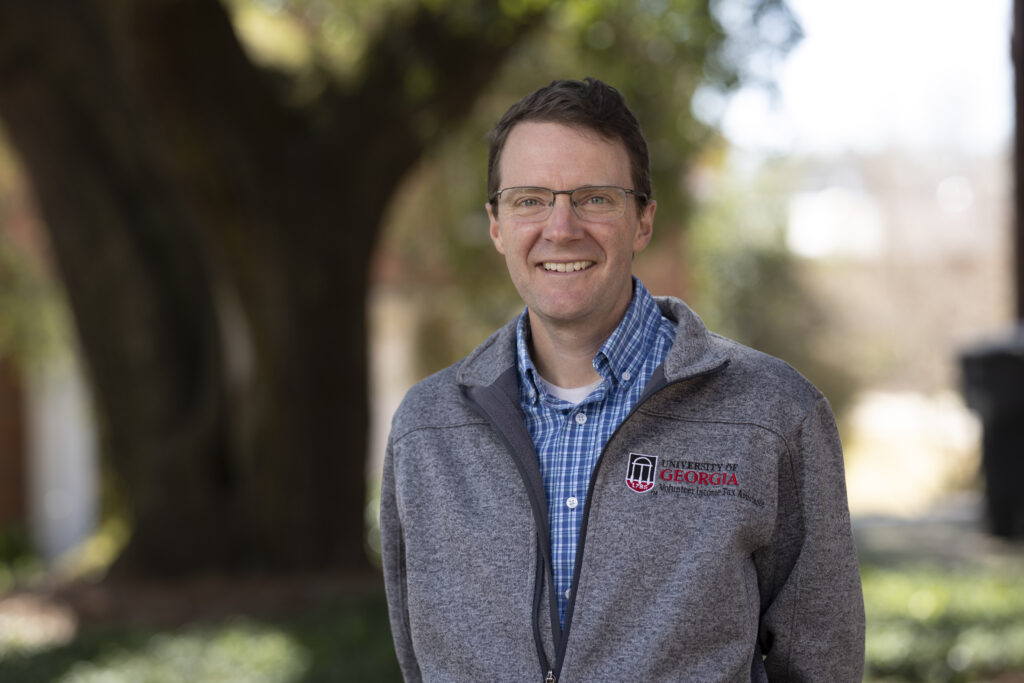
Lance Palmer
Professor
Department of Financial Planning, Housing and Consumer Economics
College of Family and Consumer Sciences
Lance Palmer teaches and researches for real impact—and that impact can be felt on the University of Georgia campus and the community.
“Dr. Palmer is the epitome of integrating teaching, research and experiential learning,” one colleague wrote.
Early in his time at UGA, he helped reestablish the campus’s Volunteer Income Tax Assistance program, allowing more than 900 undergraduate students and more than 150 graduate students to get practical, real-world experience completing federal and state tax forms. The UGA VITA partnership includes Georgia United Credit Union, the College of Family and Consumer Sciences, School of Social Work, J.M. Tull School of Accounting in the Terry College of Business and UGA Cooperative Extension.
“The experiential learning provided by Dr. Palmer’s VITA course has helped countless students gain experience in a business setting and improve their business acumen. I will forever appreciate the mentorship I received from Dr. Palmer and the lessons I learned in his class that still help me to this day,” a former student wrote.
Students have prepared 10,890 federal tax returns and even more state returns across the country, in addition to providing more than 35,000 hours of one-on-one financial services. The cumulative annual economic impact of UGA VITA since 2006, as estimated by the Internal Revenue Service, exceeds $25 million.
Palmer received the Janette McGarity Barber Distinguished Professorship in the College of Family and Consumer Sciences last year and has been a Lilly Teaching Fellow. His other recognitions include the Russell Award for Excellence in Undergraduate Teaching, the Service-Learning Research Excellence Award and the Engaged Scholar Award.
“He is one of the most creative and innovative thinkers I have met,” another colleague wrote. “All these programs have helped us to increase enrollment in our programs, generated collaborations across other colleges and departments on campus, and most importantly, elevated the quality of instruction and learning for our students.”
—Krista Richmond
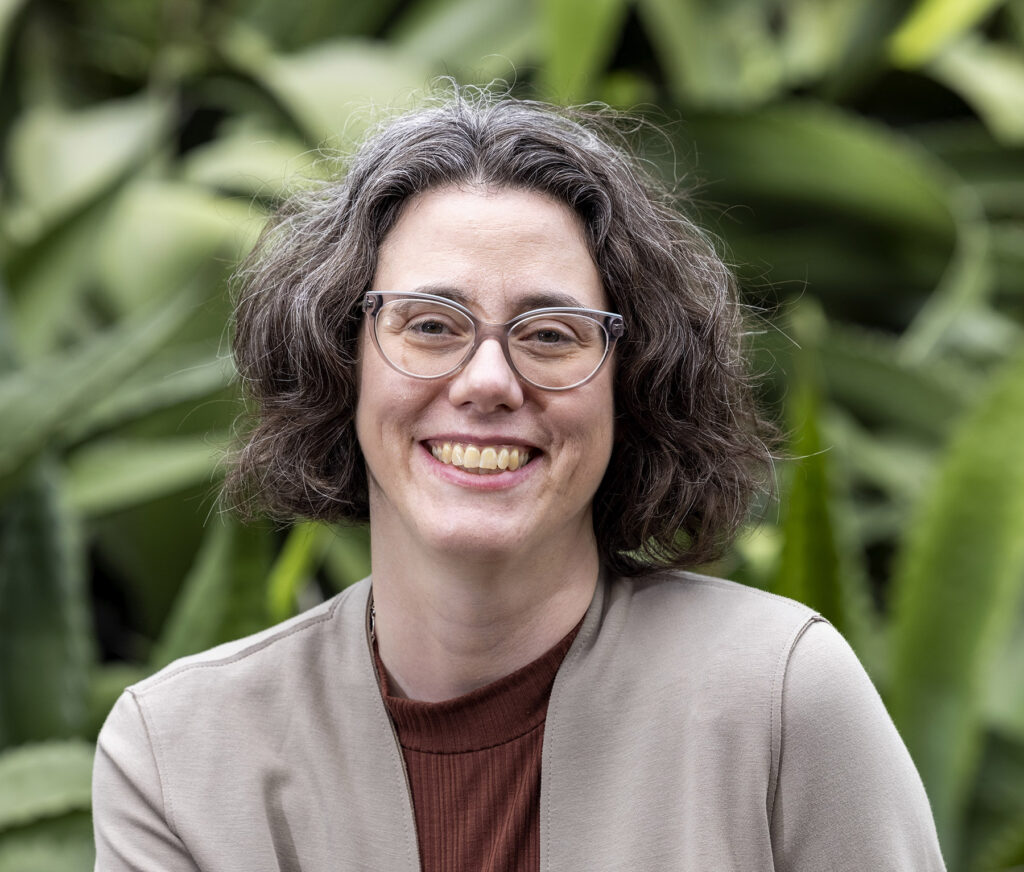
Sarah Shannon
Associate Professor
Department of Sociology
Franklin College of Arts and Sciences
Sarah Shannon’s instruction sits at the intersection of her research and teaching passions, creating a powerful learning environment rooted in scholarly inquiry.
“I ask students to critically engage with sociological theories and empirical studies that explain the causes of crime, the social forces that shape criminal punishment and the effects that each have on individuals and communities,” she said.
And students are truly engaged in Shannon’s innovative Inside-Out class, in which UGA students and individuals who are incarcerated study the criminal legal system together inside the Clarke County Jail. Within the jail classroom, Shannon facilitates active learning activities and guides dialogue around crucial and controversial issues such as “what are prisons for?” and “why do people commit crime?” with a group of students whose diversity spans race, class, gender, age and incarceration status. To teach this course, Shannon completed Inside-Out’s National Instructor Training Institute.
“Not only does she challenge students to consider new ideas from a variety of perspectives, but her innovative teaching styles and dedication to her students also has improved the caliber of instruction at UGA,” a former student wrote. “Dr. Shannon has played a pivotal role not only in shaping my own development as a scholar, but also in fostering understanding and curiosity in the UGA student body and the broader Athens community.”
Through her years at UGA, Shannon has honed her teaching skills as a Lilly Fellow, Service-Learning Fellow and Special Collections Libraries Faculty Teaching Fellow. She has also received the Russell Award for Excellence in Undergraduate Teaching, Sandy Beaver Excellence in Teaching Award, the Creative Teaching Award and the Service Learning Teaching Excellence Award. Shannon is now assistant director of the Lilly Teaching Fellows program and a member of the university’s Quality Enhancement Plan Development and Implementation committee.
“Her collegiality, expertise and reflective consideration on her experiences makes her a valued campus leader and a ‘go-to’ collaborator in enhancing our university’s community engagement practices for students, faculty and partners in the local community,” one colleague wrote.
—Krista Richmond


